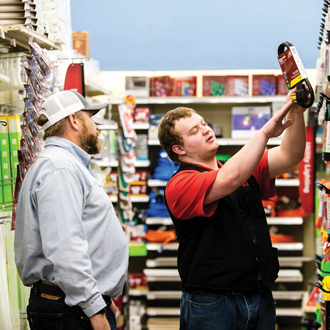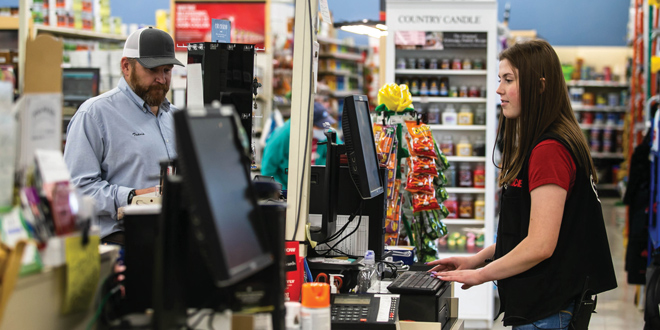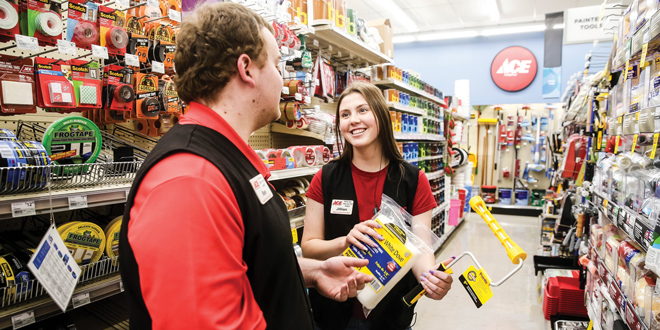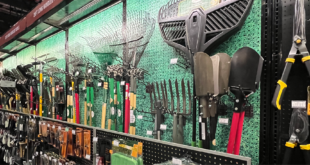Ben Houser was 16 years old when he interviewed for a job at King’s Ace Hardware in Billings, Montana. He had zero work experience and knew nothing about hardware, but he wanted to earn some cash. King’s Ace hired Ben and he started learning a lesson he will use for the rest of his life: how to be a good employee.
Five years later, Ben is now working his way through college and training new hires at King’s Ace to excel at their first jobs, too.
Many independent retailers shy away from hiring teenagers because they don’t want to spend extra time training and coaching employees who may not fully understand what it means to work hard.
Other business owners recommend giving kids a chance as a way to invest in the futures of their communities.
Read on to hear from retailers who talk about the value of offering first jobs to the youngest generation in the workforce. You’ll also find the perspectives of some of their youngest hires on what they’ve learned from their experiences on the job.
Why Hire Young Workers?
King’s Ace recently opened its sixth store in Billings, and hired seven high school students before the doors opened to customers. The chain has 30 high school and college students on the payroll.

Jack Dobbins, who oversees human resources for the operation, says teens fulfill a practical need for the growing business. The stores are open 84 hours a week and need to be fully staffed. Store managers have the flexibility to schedule teens in the evenings and on weekends when they’re not in school, giving seasoned workers day shifts if they prefer.
Sharona Eiserer, co-owner of Wood Shed Lumber & Hardware in Carrollton, Missouri, currently has seven high school students on staff.
“You have to invest in your business and you have to have young people coming up in the business to keep progressing,” she says. “Employees can’t be a dying breed.”
But at King’s Ace and Wood Shed Lumber, hiring teens isn’t only about staffing.
“You have to invest in people,” Dobbins says. “I had great mentors who helped me so much and I feel a responsibility to give back. You have to make mistakes to learn, and we all make them. We provide our teens with an opportunity to work in a safe, hands-on learning environment, where they build a foundation that can last the rest of their lives.”
Eiserer also values her first job and the positions she can now offer young people.
“I’m just so thankful that somebody believed in me and gave me an opportunity when I was 15,” she says.
6 Tips for Hiring Teens
Jason and Melanie Haley, who own Ace Hardware of Clarkston in Clarkston, Michigan, take pride in hiring and training teenagers for life beyond jobs at their store. They believe providing a first job is a public service. Jason Haley offers the following tips and thoughts on hiring the youngest generation in today’s workforce.
- Consider that the kids aren’t the problem. “As society evolves and each generation becomes wealthier, humankind and the media seem to support a fading work ethic. We feel an obligation to help parents instill a great work ethic in teens. We’ve gotten handwritten notes from our employees, thanking us for the honor of working for us. We feel very blessed to make a difference in these young people’s lives.”
- Don’t misjudge a lack of work history. “If somebody’s 19 and hasn’t worked a job, it might not be because they’re entitled. It might be because they have had other priorities.”
- See the value you offer. “You have to think of hiring teens as giving back to your community. For local owners who work in the store, this is one way you can give back to the community by giving the young people the skills and character that they will carry with them their entire lives.”
- Don’t throw them to the wolves. “The best thing we do for young employees is lead by example. We don’t just order them around. We, as the owners, will sit them down and ask how things are going and how we can help.”
- Give them a chance. “We’ve taken chances on some people who have been quite shy. They’ve become some of the most outgoing people on staff because they’ve come out of their shells. We take a much deeper personal interest in the young employees because we can mold them.”
- Scholars and athletes know how to work. “Find students who are involved in high school activities that challenge their thinking. Those teens seem to be the best fits for us.”

Training on Basics
Younger employees often need extra training on the basics of working in retail.
Dobbins and other experienced workers who train first-time employees at King’s Ace take the time to explain basic work principles because everything is new to young people who are just joining the workforce.
“They’re intimidated, even walking through the W-4 forms,” Dobbins says.
However, those training conversations can be quick and conversational.

Dobbins provides one-on-one orientation with each new hire, regardless of age. When working with students, he explains what it means to show up on time and how to communicate scheduling needs with managers.
“You have to talk about developing a work ethic and how each employee affects fellow associates,” Dobbins says. “When someone calls in sick or is absent, it affects staffing and customer service. When you take a job, you are making a commitment. It’s important to emphasize that to new employees if it’s their first job.”
Eiserer has similar conversations with students she hires.
“Not everybody understands that if you’re scheduled at 8, to come in at 7:30 or 7:45,” she says. “I’m getting to be their boss and their guidance counselor, at times. I tell them, ‘If you go somewhere else to work, I want you to impress them.’”
However, hiring young employees can strengthen your business when the workers bring new ideas, enthusiasm and an aptitude for learning quickly.
“Sometimes you spot the glimmer that they want more. They can be like sponges,” Eiserer says. “They’re wanting to know, ‘What can I do next?’ They’ve got that drive. You think, ‘Oh my goodness, how am I going to keep up? How can I challenge this kid so they don’t get bored?’”
What You Give
When Ben started working at King’s Ace, he worked in the back room building grills. A new manager pushed him and the rest of the team to be more productive and identify and meet needs within the store.
Ben accepted new responsibilities, learning to work on the salesfloor and drive delivery trucks.
He learned about answering the phone professionally and serving customers, and he grew as an employee.
“At first, I didn’t have any motivation to go out and help customers and do anything more than the assistant manager told me to do,” Ben says. “Then I saw the people who were able to produce more and worked harder in order to earn their keep. I discovered it was definitely more exciting to have more responsibility.”
In 2019, King’s Ace affirmed his growth by promoting him to shift supervisor.
“I considered myself reliable prior to being hired, but I definitely have improved,” Ben says. “There are certain things I’m being counted on to get done. The new responsibilities add a lot more to the job. I feel like I have more say in the way the show runs. It feels like I’m a valuable asset to the company.”
Jillian Smith, a 17-year-old high school student, started working for King’s Ace Hardware to earn extra money and save up to buy a car, but she has discovered that she has gained far more than that.
“I’ve learned about customer service and calming down people who have a problem and are frustrated,” Jillian says. “I love helping people and making their day better.”
She has also learned about an array of product categories that will help her with home maintenance someday.
Jillian plans to join the military after high school, which means she won’t work at King’s Ace as long as Ben has. But both young employees have served the company and gained valuable skills and experience in the process.
Training new hires is now part of Ben’s job. Coaching them on showing up to work reliably is part of training, and is an area Ben thinks employers should provide some grace for when it comes to first-time employees.
“A lot of unreliability stems from lack of work experience. They haven’t had the same opportunities or the same kind of drive as people who’ve had more than one job,” he says. “If you’re willing to hire the younger demographic, you have to stick it out and give ample opportunities to learn. Simple reminders help.”
 Hardware Retailing The Industry's Source for Insights and Information
Hardware Retailing The Industry's Source for Insights and Information











